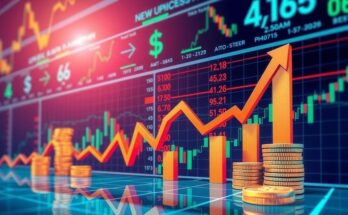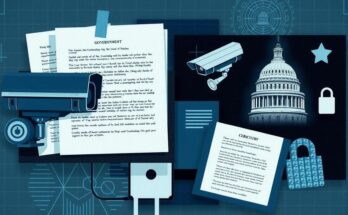Ghanaians will vote in a general election amid the worst economic crisis in a generation, with 18.7 million registered voters. Despite a vibrant democratic history, the country faces significant challenges, including soaring inflation and unemployment. The election prominently features a race between Vice President Mahamudu Bawumia of the NPP and former President John Mahama of the NDC. Both candidates must address economic concerns that resonate deeply with the electorate.
As Ghanaians prepare to cast their votes on Saturday in a pivotal general election, the backdrop is set against the most severe economic crisis to afflict the nation in years. Approximately 18.7 million citizens are eligible to partake in both presidential and legislative elections, yet there seems to be a perception of limited change from the two main candidates. Once heralded as a model of democracy in West Africa, Ghana now grapples with soaring inflation and unemployment, leading to widespread discontent among its populace.
Historically a bastion of democratic stability, Ghana’s recent political and economic challenges have caused a shift in public sentiment. An Afrobarometer poll revealed that 82% of Ghanaians believe the country is off course, highlighting significant dissatisfaction with the current government. Despite twelve candidates vying for the presidency, the election is largely viewed as a contest between Vice President Mahamudu Bawumia and former President John Dramani Mahama.
Mahamudu Bawumia represents the ruling New Patriotic Party (NPP), which has struggled to remedy the economic turmoil, while John Mahama leads the opposition National Democratic Congress (NDC), which was ousted in 2016 due to unmet economic expectations. While the two parties label themselves with ideological distinctions, analysis shows little substantive difference between their economic proposals.
In addition to voting for the president, Ghanaians will elect 276 members of parliament. Both the NPP and the NDC currently hold equal representation in a legislature of 275, with an independent member aligning with the ruling party. Prior to the election, both candidates have made fervent final appeals to voters. Bawumia aims to continue the outgoing administration’s economic initiatives, while Mahama emphasizes the need to “reset” various aspects of governance and infrastructure.
Despite Election Day elation marked by political events and strong public displays of support, underlying tensions regarding the economy persist. Ghana faced a default on foreign debts last year, and skyrocketing inflation reached 54% at the end of the last year. The ongoing crisis has notably impacted the affordability of essential goods. Additionally, illegal gold mining, which ravages the environment and poses job challenges, has further animated electoral discourse.
In conclusion, Ghana’s upcoming general election is crucial for its democratic identity amid an economic crisis. With profound inflation and job scarcity affecting the populace, the future legislatively and democratically may hinge upon the choices made on Saturday. Though the spotlight falls on Bawumia and Mahama, both candidates must grapple with restoring economic stability for the nation’s recovery.
Original Source: apnews.com




